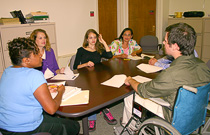What is the school counselor’s responsibility in the transition planning process?
Page 8: Post-Secondary Preparation: Independent Living
 IDEA’04 requires measurable post-secondary goals for independent living, when appropriate. However, a precursor to independent living involves learning self-determination and social skills. When students are able to identify their goals and effectively communicate with others in a variety of settings, they can achieve greater success. Young people who can do this are self-determined and able to advocate for themselves and utilize effective social skills in the areas of education/ training, employment, or independent living.
IDEA’04 requires measurable post-secondary goals for independent living, when appropriate. However, a precursor to independent living involves learning self-determination and social skills. When students are able to identify their goals and effectively communicate with others in a variety of settings, they can achieve greater success. Young people who can do this are self-determined and able to advocate for themselves and utilize effective social skills in the areas of education/ training, employment, or independent living.
Self-Determination
Broadly defined, self-determination is the ability of a person to be actively involved in and in control of his or her own life. Students with self-determination can be described as being able to:
- Define goals for themselves
- Take the initiative to make their goals happen
- Make choices and understand the consequences of their actions
- Seek support when taking risks
Self-determination is affected by one’s thoughts, beliefs, knowledge, and skills. As students begin and continue their transition from high school to postsecondary living, it is normal for them to feel a range of emotions, such as excitement, fear, anxiety, and anticipation. School counselors may help students to define and improve their self-determination by:
- Helping students develop a greater self-awareness
- Teaching decision-making, goal-setting, and negotiation skills
- Creating problem-solving opportunities
Keep in Mind
When students demonstrate greater self-determination, some parents may feel a loss of control in directing their son or daughter’s life plans. While it is easy for adults to make decisions for students who have disabilities, it is preferable to assume that they are competent to make their own decisions. The adults’ roles shift to support students in identified areas of need.Environment also contributes to the development of self-determination. When students have more opportunities to make choices, they in turn have opportunities to identify the effect of those choices. The questions below can help determine whether adequate support is in place to help students foster self-determination.
| Developing Self-Determination | |
| Does the environment provide role models or mentors for the student? | |
| Does the student receive specific instruction aimed at developing identified self-determination skills? | |
| Are students provided with opportunities to make choices? | |
| Are students given opportunities and encouraged to express themselves? | |
| When making decisions, are students encouraged to identify various options? | |
| Is someone available for the student when he or she needs advice? | |
Social Skills
Like self-determination skills, social skills play an important role in the success of transition and future independent living pursuits. In many cases, students who have strong social skills may find greater success in their post-school environments. School counselors should help students understand the impact of social skills in all environments and the rationale for learning appropriate behaviors. They may provide instruction in a variety of social skills areas:
| Interpersonal Skills | |
| Use courtesy and show respect to others. | |
| Cooperate with others. | |
| Recognize non-verbal communication. | |
| Accept and follow directions. | |
| Respect cultural diversity. | |
| Perform as a team player. | |
Independence in Living
 Individuals who practice self-determination and who have good social skills are more likely to be successful in independent living arrangements. Independent living may include a range of living arrangements (e.g., living alone, with a roommate) and housing options (e.g., apartment). Even when it comes to housing, students must understand the type of disability they have and identify the types of accommodations that they may require.
Individuals who practice self-determination and who have good social skills are more likely to be successful in independent living arrangements. Independent living may include a range of living arrangements (e.g., living alone, with a roommate) and housing options (e.g., apartment). Even when it comes to housing, students must understand the type of disability they have and identify the types of accommodations that they may require.
For Your Information
Many residential options are available to individuals with disabilities (e.g., supported living in own apartment, protected settings, group homes).
Residential Options
Supported living in own apartment – Under this arrangement, individuals with disabilities are given the support they need to live in their own home. Available assistance includes help with cooking, administering medication, and body positioning. Without this type of support, individuals would likely live in a more restrictive environment.
Protected settings – This option allows individuals with disabilities to live as independently as possible. Supervision is provided on an as-needed basis. Examples of protected living include:
- Foster home – A family gives room and board to a person with a disability and in return receives financial compensation.
- Co-residence apartment – An individual with a disability lives with a roommate who does not have a disability and who is able to offer support.
Group home – A small group of individuals with disabilities share a residence. Group homes may provide long-term residence for individuals or serve as a transitional setting for an individual who may be able to seek a more independent living situation. Group homes are typically part of a community. In addition to receiving live-in supervision, all of the residents receive various kinds of support (e.g., training in money management, assistance with cooking and other household tasks, transportation services).
Transition Update – Sandra Practices Self-Determination and Social Skills
Sandra has been present during her IEP meetings for several years but has never been an active participant. Mr. Hunter has been working with Sandra to help her to become prepared and to be able to contribute information about herself. During Sandra’s IEP meeting, she will:

- Arrive at the meeting on time
- Sit at the head of the table
- Introduce all members of the IEP team
- Use “I” statements when asserting her needs